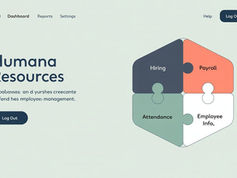What role does data security play in the implementation of an HR Management System?
- Iqbal Mostofa
- Apr 8, 2025
- 4 min read

In today’s digital world, safeguarding data is paramount, especially when dealing with sensitive employee information in Human Resource Management Systems (HRMS). As businesses continue to rely on technology to streamline HR processes, understanding the significance of data security in the successful implementation of HRMS becomes increasingly crucial.
Understanding Data Security in HRMS
Data security refers to the protection of digital data from unauthorized access, corruption, or theft throughout its lifecycle. HRMS stores vast amounts of sensitive information, such as personal employee details, payroll data, and performance records. Ensuring that this data remains confidential, accurate, and accessible only to authorized personnel is a key aspect of HRMS implementation. Without robust data security measures, companies risk exposing sensitive employee information to cyber threats, data breaches, and compliance violations.
Key Data Security Challenges in HRMS Implementation
Implementing a secure HRMS involves overcoming several challenges:
Data Breaches and Cyber Attacks:
HRMS systems are prime targets for cybercriminals because they house a wealth of personal and financial data. A data breach could lead to the exposure of employees’ personal information, such as social security numbers, addresses, and bank details, which can have severe consequences.
Insider Threats:
In addition to external threats, employees or internal users with malicious intent or carelessness may compromise data security. It’s essential to limit access to sensitive data and monitor user activities regularly to mitigate insider risks.
Unauthorized Access:
With multiple stakeholders accessing HRMS, from HR managers to team leaders, ensuring that only authorized individuals can access certain levels of data is crucial to prevent unauthorized access.
Compliance with Data Protection Regulations
Data protection regulations like the General Data Protection Regulation (GDPR) and the California Consumer Privacy Act (CCPA) impose strict requirements on organizations to protect employee data. HRMS plays an important role in ensuring companies comply with these regulations by implementing proper data encryption, secure data storage, and mechanisms for obtaining and managing employee consent for data collection.
For instance, GDPR mandates that businesses protect employee data by utilizing encryption and anonymization techniques to minimize the impact of potential breaches. Failure to comply with these regulations can lead to hefty fines and significant reputational damage. Therefore, integrating data security into the HRMS is vital not only for compliance but also for maintaining the trust of employees and stakeholders.
Best Practices for Data Security in HRMS
To implement a secure HRMS, organizations should adopt several best practices:
Strong Authentication Protocols:
Ensuring that only authorized users access the HRMS can be achieved by implementing multi-factor authentication (MFA) or biometric authentication, providing an additional layer of security.
Regular System Updates and Patching:
Cyber threats evolve over time, so regularly updating HRMS software is essential to fix vulnerabilities and prevent exploitation by hackers. This includes installing security patches and performing routine security audits.
Role-Based Access Control (RBAC):
One of the most effective ways to protect sensitive HRMS data is by controlling access based on the user’s role within the organization. For example, payroll data might be accessible only to HR managers, while performance data may be limited to supervisors.
Employee Training on Data Privacy:
Employees play a crucial role in maintaining data security. Providing training on how to handle sensitive information securely, recognize phishing attempts, and adhere to privacy protocols is an effective way to prevent accidental data leaks.
Benefits of Implementing Data Security in HRMS
Protecting Employee Trust and Privacy:
Employees trust organizations to handle their personal and financial data securely. By prioritizing data security, companies demonstrate that they respect employee privacy and are committed to protecting their information.
Mitigating Financial and Reputational Risks:
Data breaches or non-compliance with privacy laws can result in significant financial penalties and harm an organization’s reputation. A secure HRMS reduces the likelihood of such incidents, protecting both the company's financial health and public image.
Enhancing Operational Efficiency and Compliance:
With robust data security measures in place, HRMS can operate seamlessly while ensuring compliance with data protection laws. This leads to better data management, smoother HR operations, and fewer legal risks.
Conclusion
Data security plays a pivotal role in the successful implementation of HR Management Software (HRMS). With the growing volume of sensitive employee data stored in digital systems, businesses cannot afford to ignore the risks associated with inadequate data protection. By adopting best practices in data security, organizations can ensure that their HRMS is secure, compliant with data protection laws, and trusted by employees. In turn, this will contribute to smoother HR operations, reduced risks, and a safer working environment for all stakeholders.
FAQs
Why is data security important in HRMS?
Data security ensures that sensitive employee information is protected from cyber threats, minimizing the risk of breaches and ensuring compliance with regulations.
What types of data require protection in HRMS?
Personal data, payroll details, performance reviews, and other confidential employee records need strong security measures in place.
How can HRMS ensure compliance with data protection laws?
By implementing encryption, anonymization, and regular security audits, HRMS platforms can meet GDPR, CCPA, and other data protection regulations.
What are the best practices for HRMS data security?
Best practices include using strong authentication methods, regular updates, access control systems, and employee awareness training on data security.
What are the consequences of poor data security in HRMS?
Poor data security can lead to data breaches, loss of employee trust, legal penalties, and financial losses, all of which can damage the organization's reputation.












Comments